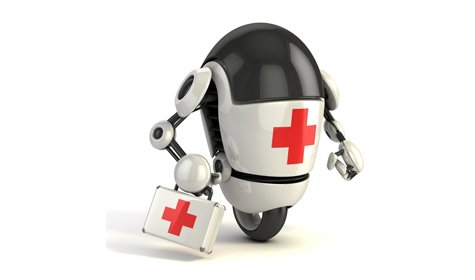It’s true. Health care technology is transforming at record speeds, almost at pace with Apple’s release of a new iPhone. A digitally globalized world means more power than ever is in the hands of the patient. Around one in 10 Americans wear some form of technology on a daily basis, whether it’s a smart-phone or a device to track medical information.
“We see wearable devices on a daily basis. The most common devices – like the Fitbit –are built-in mechanisms that communicate with your cell phone. Soon, we will have devices in all environments – they will monitor us in our homes, while we’re at work and during our personal lives. As these different devices ‘talk’ to each other, they will be able to know people’s habits and practices. Essentially, they will coach and motivate patients,” Benden said.It may sound like the premise of a science fiction film, but Mark Benden, C.P.E., Ph.D., associate professor at the Texas A&M Health Science Center School of Public Health, director of the Texas A&M Ergonomics Center and member of the Center for Remote Healthcare Technologies and Systems, believes wearable technology is rapidly approaching the point where devices become omniscient about a patient’s needs and personal habits.
And in health care, this type of scientific advancement is powerful. With more than 140 million Americans living with at least one chronic medical condition, these devices could keep patients out of the hospital and monitored on a routine basis.
Some of these devices are already a reality. According to Benden, clinicians use devices for type I and type 2 diabetes that monitor the conditions non-invasively. “There’s a device called Spire that clips to your waist and monitors stress levels. We’ve also seen doctors use implantable devices in patients with heart disease that monitor, track and record data on the patient’s condition.”
“Wearables are ‘on’ us all the time,” Benden said. “But, in three to five years they will be on and ‘attached’ to us. I expect we will see progress like a transdermal tattoo to monitor blood sugar and nicotine levels, or contact lenses that detect biomarkers for certain conditions. We will also see a rise in implantable devices powered by movement, blood flow or breathing.”
For Benden, the potential in technology is especially important for disease prevention. “Right now, health care in our nation really consists of ‘sick-care.’ While there are many conditions that can’t be prevented, the majority of the health care world is focused on diagnosing and treating bad outcomes, and we don’t put enough focus on the prevention side of health care,” he said.
And prevention is where technology could be a game-changer. Most people have the knowledge of what they need to do to make a change, but they often don’t follow through. “In five to 10 years I think the majority of devices will be sentient and omni-present,” Benden said. There are a variety of triggers for different conditions, but with the interconnectivity of technology, our devices will be able to intervene before we perform the undesirable behavior or unhealthy outcome.”
Benden said one such example is a device that could help a person who is struggling to quit smoking. “Current tech that detects cigarette smoke and warns the person not to smoke is helpful, but for prevention, we need devices that recognize a habit or routine that is leading up to us taking a smoke break and then intervening before we get to the point of lighting up. We make daily choices for our health, and the key is making the right choices consistently. Most things we treat – like lung cancer caused by smoking – are preventable. Devices will help encourage us to make the correct choices for our health.”
How will the rise of the machine affect relationships with our doctor? Benden believes remote medicine is part of the future of health care.
“Many people don’t think to tell their health care provider about conditions or situations impacting their health. If they wear a device, the tracker will automatically know all of their habits 24/7 and a computer algorithm can record these habits,” Benden said.
According to Benden, we can expect a doctor to be on the receiving end of this data, and the bulk of the work will move from the doctor to the computer. “The computer will be able to provide much more data analysis and will outshine our greatest clinicians’ diagnostic abilities due to its ability to process and integrate huge streams of data,” Benden said. “The potential for this technology is extremely significant and the power of information will be integral for disease prevention and treatment.”
Texas A&M Health Science Center is Transforming Health through innovative research, education and service in dentistry, medicine, nursing, pharmacy, public health and medical sciences. Original article: http://news.tamhsc.edu/?post=the-computer-will-see-you-now-could-technology-replace-doctors

